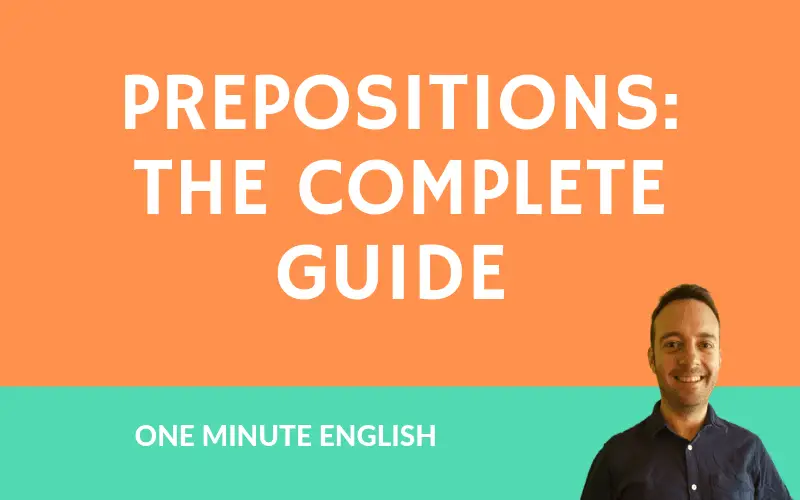Prepositions can be a difficult part of a language to learn because they are short words and are often used in different situations than in other languages. As a teacher, I have noticed that students even with a high level of English still find prepositions hard and make mistakes regularly.
In order to fix this problem you need to learn how to use prepositions and why we use prepositions in different contexts and then of course practice what you learn.
What is a preposition?
A preposition in English is a part of speech that shows the relationship between a noun and another part of the sentence. There can also be dependent prepositions and prepositional phrases which I will explain below.
For example:
The man is behind (Preposition) the house. (Noun)
This example shows the relationship between two nouns(man and house)
The man drove through (Preposition) the tunnel. (Noun )
This example shows where the man drove.
How to use a preposition?
We use prepositions in different contexts but in general we use a preposition with a noun to show:
The time: I was born in (Prep) March (Noun).
The direction: I walked towards (Prep) the bar(Noun)
The location:I am in front of (Prep) the cinema (Noun)
Or introduce something new: I want a coffee with (Prep) milk (Noun)
Notice how the preposition usually comes before the noun. This Noun is called the object of the preposition. We want to show the relationship of this noun to the other part of the sentence.
A common structure is:
Subject Verb Prep Noun
I went for a coffee.
Preposition before verb
We do not usually use a preposition before a verb.The exception to this is when you have two verbs. If you have a verb after a preposition then you need to put it in the “ing”(gerund) form.
What do you think about (Prep) going (Verb) to the park?
I am good at (Prep) playing (Verb) football.
These are examples of dependent prepositions(to think about, to be good at)
Gerunds and infinitives
I (look forward to) playing football
In this example “to” is a preposition
I want (to play) footballl
In this example “to” is part of the infinitive(want +infinitive)
What are the different types of preposition?
We often see prepositions in English to connect two parts of a sentence but we also use prepositions as dependent prepositions and in prepositional phrases.
In these cases it is better to learn the phrases in “chunks”. This means that you learn a few words together and then you can use these phrases again and again.
For example:
How is it going?
You don’t need to think about the meaning of each word here. You just know that this is a way to ask about somebody’s life.
So learning in chunks is a good idea for the following types of prepositions
Dependent prepositions
Some verbs, nouns and adjectives take prepositions naturally and are always used together. You probably have noticed some examples like “Wait for” or “Listen to”. There are no rules when it comes to this so you just have to learn them as you come across them!
- Verb + preposition
There are many verbs which are used with prepositions so the verb and preposition work together as one unit. You need to learn these and pay attention to when verbs take prepositions.
Some Examples
You can rely on me
I know that I can depend on you
He succeeded in his attempt
Do you believe in God?
What has happened to your dress?
Sometimes the preposition can change the meaning for example: ,
To think of something (an idea)
To think about something (deliberate, think longer)
Prepositions are hard so here is a Gif of me dancing to the music that I am listening to!

- Noun + preposition
Let’s look at some examples:
What is the reason for his bad behaviour?
This is a photograph of when we were on holiday.
There has been a huge increase in sales.
I hope we find a solution to the problem
- Adjective + preposition
It was generous of you to offer to clean my car
My boss was angry about (something) the sales results
My boss was angry with (someone) me for not selling enough cars

Joan is married to my brother
Pay particular attention to these examples as they may not be the same as your language.
Prepositional phrases
Prepositional phrases are groups of words with a preposition at the beginning and ending in the object of that preposition(usually a noun). This is just a nice way for us to have common expressions that we can use in many situations
We can think of them as a preposition and a noun helping each other to express one thing like……
In the middle
In time or on time or about time
I have been waiting forever for a complete guide to prepositions.
They usually act as an adverb or an adjective
Can you finish a sentence with a preposition in English?
Yes! You can end a sentence in English with a preposition. Sometimes it is more natural in modern English to end a sentence with a preposition. Here are a few examples of when you can do that:
- Wh Questions
Who are you talking to?
2. Relative clauses
She told me that was the person she couldn’t put up with.(Bonus point for me! 2 prepositions!!!)
3 Passive structures.
She was being talked about.
4.Infinitive structures
She had to do her buttons up
To Summarize….
You can see that prepositions can be used in three ways:
To show the relationship between two things
A dependant preposition
In a prepositional phrase
We also often see prepositions in Phrasal verbs. You can see lots of examples of Phrasal verbs on my Youtube channel or I highly recommended that you take the course with Espresso English.
The 46 most common prepositions in English (with examples)
About
The book is about food.
What is the story about?
Above
I live above a shop.
The shelf is above the T.V
Across
I live across the road.
The shop is across from the cinema.
After
The movie is after dinner.
I always study after school.
Against
Barcelona play against Liverpool.
I hit my head against the wall.
Along
I always walk along the river.
We are going to the cinema. You should come along.
Among
We are among the best footballers in the country.
Who among us is a good fighter?
Around
There around 50 people in this room.
I live around the corner.
At
Let’s meet at the park.
Class starts at 9am.
Before
I always drink coffee before work.
I brush my teeth before bed.
Behind
Look out!! There is a big dog behind you.
I live behind a cinema.
Below
The basement is below my house.
See below!
Beneath
There are new shoes beneath the stairs.
There is water beneath the ground.
Beside
I sit beside John in class.
I live beside a petrol station.
Between
There is a big space between us.
You need to leave a space between the title and the paragraph.
Beyond
Astrophysics is beyond my knowledge.
What is beyond the park?
But
I like ice cream but I prefer chocolate.
It was a good movie but I didn’t like the ending.
By
I did it all by myself.
You need to write the report by Monday.
I live by the river.
Down
I walked down the road.
The office is down the stairs.
During
I fell asleep during the movie.
It happened during the game.
Except
I like all vegetables except broccoli.
Everybody is going except me.
For
I ate bread for breakfast.
I had to wait for a month.
From
I am from Ireland.
The class is from 9 to 10.
In
I live in Dublin.
The water is in the bottle.
Inside
Let’s go inside. It is cold out here.
I put the cup inside the cupboard.
Into
I walked into the room.
He walked into the wall!
Like
My brother is like my father
You look like George Clooney.
Near
I live near you.
The toilet is near the stairs.
Of
This piece is part of the puzzle.
I am part of the team.
Off
I got off the train at Heathrow airport.
I took off my sweater.
On
I work on Tuesdays.
The book is on the table.
Out
I walked out of the shop.
Take out the trash.
Outside
I don’t like to go outside in the winter.
The football field is outside.
Over
He lived in a flat over a supermarket.
Go over there!
Past
I live past the shopping center on the right.
Go past the cinema and turn right.
Since
I have been here since the morning.
I have played guitar since I was 16.
Through
We need to drive through the tunnel.
I have seen many concerts down through the years.
Throughout
He talked throughout the whole movie.
I have traveled throughout the country.
To
I am looking forward to the movie.
I work from 9 to 5.
Towards
Go towards the center of the town.
We are moving towards the station.
Under
The book is under the T.V.
I have 50 people working under me.
Until
I have to work until 6.
We will be here until the end.
Up
Let’s go up to the roof.
I need to look that up in the dictionary.
With
I love having a coffee with my breakfast.
I live with four other people.
Within
It is within your rights to apply for citizenship.
That is within the rules.
Without
I can’t live without Netflix.
I sometimes like coffee without sugar.
- 10 Words or Phrases “To Make Her Feel Special” - October 16, 2024
- Synonym Generator - September 11, 2024
- [BrutallyHonest] Langua AI Review – Can you learn a language with AI? - April 23, 2024



Pingback: 10 Prepositions in English - One Minute English
Pingback: Prepositions you should know - Real English for Gamers
Pingback: Prepositions of place in English(Videos, examples and Exercises) - One Minute English